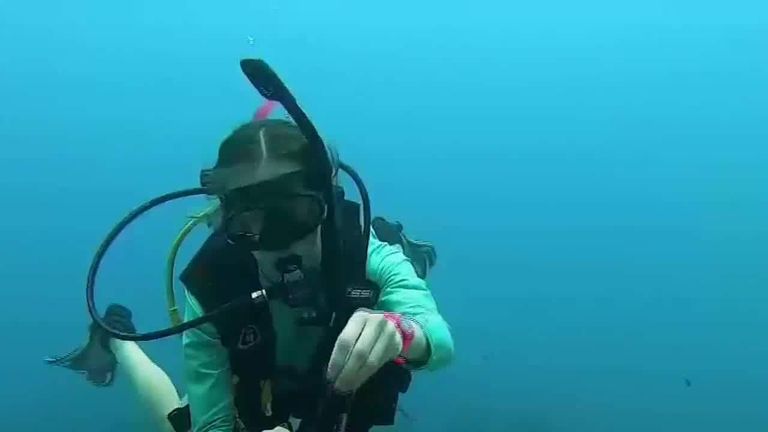Deep Ocean Live: Climate change is killing the ocean's coral reefs
Sky News visits Cousin Island in the Seychelles, where warming waters have killed large areas of the coral reef.
Monday 4 March 2019 21:05, UK
Rising sea temperatures are having a devastating impact on the coral reefs surrounding the holiday islands of the Seychelles.
Sky News was taken to Cousin Island by the environmental organisation Nature Seychelles. The reserve is known for its vibrant bird life.
But parts of the reef surrounding the granite outcrop have been reduced to rubble by warming waters.
Structures that would have taken hundreds of years to grow, and supported a myriad of marine life, have collapsed.
The coral is dead. Most of the fish long-gone.
The affected area is a coral graveyard - and climate change is the cause.
Chloe Shute, a conservationist with Nature Seychelles, said: "This reef experienced two bleaching events in the past few decades, one in 1998 and one in 2016, both of which caused significant coral mortality.
"It's horrible to imagine that this is happening in many other reefs around the world, it's not just here."
A rise of just one or two degrees is enough for coral to turn a ghostly white, bleaching that becomes fatal unless the water cools.
Because the main islands of the Seychelles sit in a shallow basin of water, the reefs are vulnerable to spikes in sea temperature. In 1998, 90% of the coral died.
Satellite observations by the US National Oceanic and Atmospheric Administration show warm water is once again spreading across the Indian Ocean and is predicted to cause coral bleaching in the Seychelles in the coming weeks.
But bleaching events are also an opportunity for Nature Seychelles.
Divers are selecting the surviving coral, growing fragments on ropes and then cementing them on the sea bed.
So far they've transplanted 24,000 in an area the size of a football field, the beginnings of a more heat resistant reef.
Already fish are returning.
But Paul Anstey, a reef rescuer with Nature Seychelles, cautions it's a short-term fix.
He said: "What we are trying to do is maintain that ecosystem function whilst the world gets its act together and global corporations and governments start to make the changes which are necessary to really combat climate change.
"It should be a moral obligation to make the choices and decisions that are necessary to solve that problem."
A quarter of marine life depends on coral reefs. But at the current rate of global warming 99% of shallow water reefs will die this century, according the Intergovernmental Panel on Climate Change.
Little is known about the health of coral below 40m (131ft), beyond the reach of most scuba divers.
But the Nekton mission will send submersibles down to survey reefs in the deep water around Aldabra, a coral atoll 600 miles southwest of the main Seychelles group.
They will be the first humans to explore the area.
Sky News will join the mission, descending hundreds of metres to broadcast the first live programmes from the twilight zone in a series called Deep Ocean Live.
:: Sky News will broadcast live from 300m down in the Indian Ocean on 18,19 and 20 March. The series will examine the impact of climate change and plastic pollution. It includes the deepest-ever live news programme from submersibles.
:: Sky's Ocean Rescue campaign encourages people to reduce their single-use plastics. You can find out more about the campaign and how to get involved at










